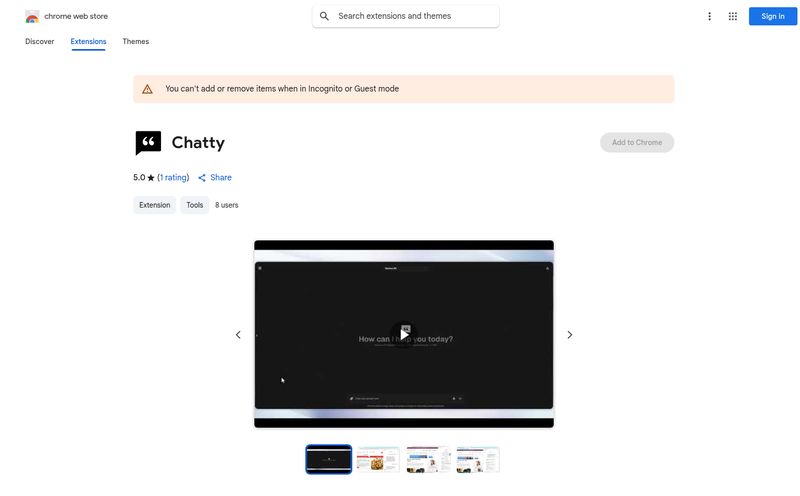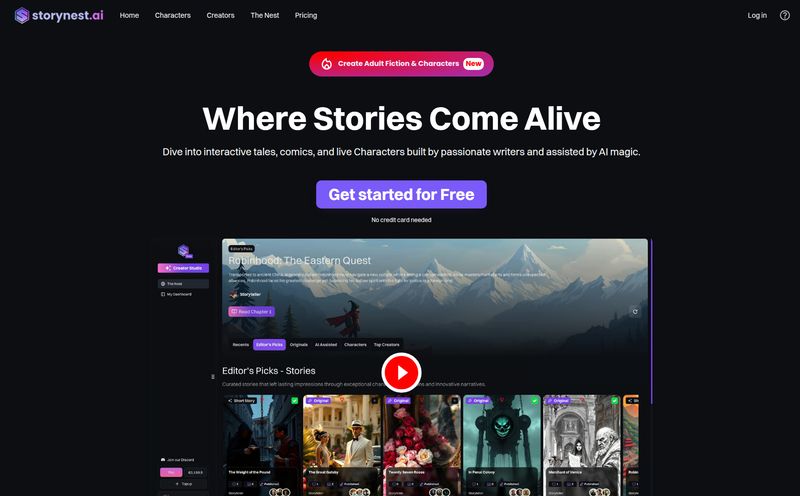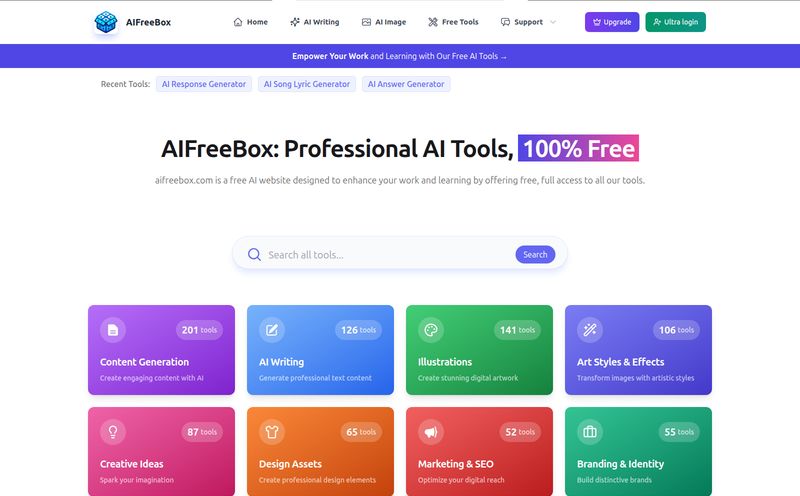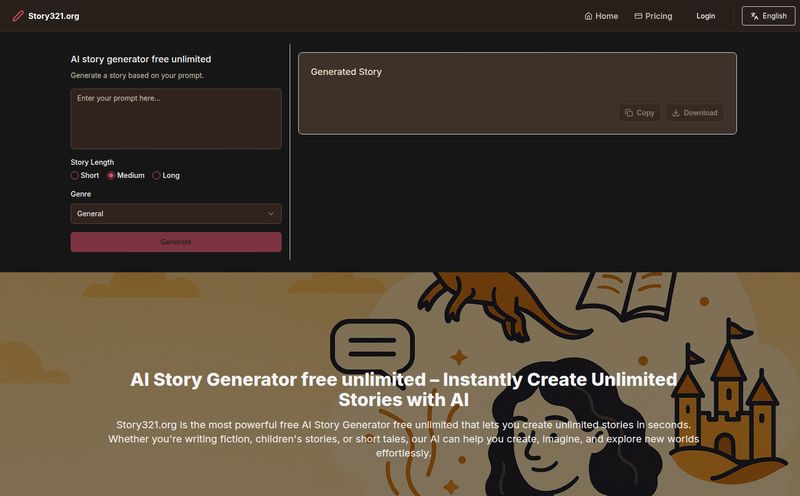Staring at a blank page is a special kind of terror. That blinking cursor mocks you, doesn't it? I’ve been there more times than I care to admit. You have this brilliant idea for a story, a whole world living in your head, but getting it onto the page feels like trying to build a ship in a bottle. With chopsticks.
For years, the debate in writing circles has been about plotters versus pantsers. But now, there’s a new player in the game, and it’s stirring up a whole lot more controversy: Artificial Intelligence. Is it the death of creativity? A soulless content machine? Or is it just the next evolution of the word processor, a tool to help us work smarter?
I’ve always leaned towards the “it’s a tool” camp. So when I stumbled upon a platform called Write Books With AI, which promises to help you write books “faster, smarter, and better,” my curiosity was officially piqued. This isn’t just another GPT wrapper; it claims to be a structured co-pilot for your entire writing process. But does it deliver? I decided to take a look.
So, What is Write Books With AI, Really?
At its core, Write Books With AI isn't a magic button that spits out a finished novel. Thank goodness. Instead, think of it as a highly organized, AI-powered project manager for your book. It guides you from that first spark of an idea all the way to a final, exportable draft. It’s less of an autopilot and more of a GPS for your narrative, providing directions and suggestions, but leaving you firmly in the driver's seat.
The platform is designed to break down the monumental task of writing a book into manageable, AI-assisted steps. You provide the high-level vision, and it helps fill in the scaffolding. What really caught my eye is the emphasis on human control. At every stage, you’re the editor, the director, the one making the final call. This isn’t about replacing the writer; it’s about augmenting them.
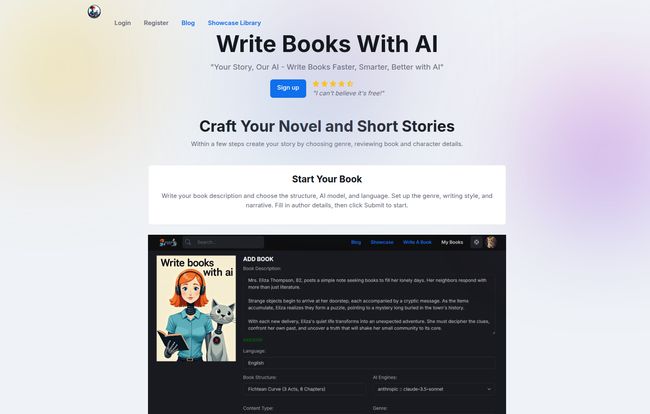
Visit Write Books With AI
A Quick Tour of the Writing Process
The user interface, from what I can see in the demos, is clean and methodical. It takes you on a logical path from concept to creation. Here’s how it seems to work.
Step 1: Laying the Foundation
It all starts with the 'Add Book' screen. Here, you plug in the vitals: genre, writing style, point-of-view, and even the language. This is probably the most important step. The quality of the AI's suggestions down the line is going to depend heavily on how well you define your project here. Garbage in, garbage out, as the old saying goes. It's like giving your new intern their first briefing—the more detail, the better the results.
Step 2: The AI Brainstorms With You
Once you’ve set the stage, the AI gets to work. It doesn't just start writing prose. Instead, it offers up suggestions for your book's structure, potential outlines, and even detailed character biographies. This is where I can see it being a massive help for overcoming that initial inertia. It’s like having a brainstorming partner who never runs out of ideas, available 24/7.
Step 3: From Chapters to Beats
With an outline in hand, the platform helps you flesh out each chapter. It breaks them down into individual “beats”—the key moments and actions that drive the story forward. You review the chapters and then add short descriptions for each beat. Essentially, you're the director telling the AI what needs to happen in the scene. The AI then generates the prose based on your instructions, which you can then edit and refine. This human-in-the-loop system is what makes it feel collaborative rather than automated.
Step 4: The Grand Reveal
After you’ve worked through all the chapters and beats, voilà. Your book is assembled. The platform even generates a cover image, which is a neat touch for visualizing the final product. From there, you can export your masterpiece and get it ready for publishing. The idea of going from a vague concept to a 50-page story in a day, as they suggest is possible, is pretty wild.
The Good, The Bad, and The AI-Generated
What I Really Liked
There's a lot to be optimistic about here. The sheer speed is the most obvious advantage; it can drastically cut down the time spent on outlining and first drafts. For writers on a deadline or self-publishers in the fast-moving digital market, this could be a game-changer. I also think the idea-generation aspect is a powerful antidote to writer's block. Sometimes you just need a little nudge to get the creative juices flowing. And a big one for me: privacy. The platform states that your work remains private. In an era where every major AI model is being scrutinized for how it uses data, that’s a huge plus. The ability for power users to bring their own API keys is also a smart move, offering more control and potential cost savings.
A Few Caveats to Consider
Of course, no tool is perfect. The final quality is still very much dependent on the user. You can’t just click through the steps and expect a Pulitzer-winning novel. You'll need to edit, rewrite, and inject your own voice and style. Some might also argue that relying on AI suggestions could hamstring a writers own creativity. I can see that, but I think it depends on the person. For some, it might be a crutch; for others, a springboard. And lets be real, the quality of AI suggestions can be... inconsistent. We’ve all seen AI go off the rails. You have to be prepared to sift through the suggestions and discard the ones that don’t fit your vision.
So, Who Is This Tool Actually For?
I don't see this replacing the traditional process for literary novelists who spend a decade polishing a single manuscript. And that's fine. But I do see a massive audience for it:
- The Prolific Self-Publisher: Someone who needs to produce a series of genre fiction books quickly to keep their audience engaged.
- The Hobbyist Writer: The person who has always wanted to write a book but gets bogged down and gives up. This tool provides the structure to finally get it done.
- The Overwhelmed Plotter: A writer who loves detailed outlines but hates the time it takes to create them.
- The Stuck Pantser: A writer who flies by the seat of their pants but has written themselves into a corner and needs a way out.
It's a practical solution for getting words on the page. And sometimes, that's the hardest part.
What About the Price Tag?
Here’s a fun little twist. Naturally, I clicked over to the pricing page to see what this would set a writer back. And I was greeted with... a 404 error. Page Not Found! Now, this could mean a few things. They could be in the middle of updating their plans, it could be a temporary glitch, or perhaps they're operating on an invite-only basis for now. It adds a little mystery to the whole thing. The mention of bringing your own API key does suggest that there will be different tiers or a pay-as-you-go model for heavy users. I'll be keeping an eye on this for sure.
Frequently Asked Questions about Write Books With AI
- Do I still own the rights to my book?
- According to their site, your work remains private and yours. This is a critical feature, and you should always own 100% of what you create. It’s your story, the AI is just the pen.
- Can it really write a full-length novel?
- The platform supports everything from short stories to full-length novels. The process is scalable, so whether you're writing a 10,000-word novella or a 90,000-word epic, the structured approach should hold up.
- Is the AI-generated text actually any good?
- This is the million-dollar question. The quality of AI text varies. It’s generally great for first drafts and generating basic prose, but it will lack the unique voice, subtext, and emotional depth that a human writer provides. Expect to do a lot of editing to make it shine.
- Is this difficult to use for non-techy writers?
- From the looks of it, the platform is designed to be very user-friendly. The step-by-step process seems intuitive, guiding you through each stage without requiring any knowledge of how the underlying AI works.
- So, is it free or what's the deal with the pricing?
- As of this writing, the pricing page isn't active. It's best to check their website directly for the most current information. The option for bringing your own API key suggests flexible plans may be available.
My Final Thoughts
So, is Write Books With AI the future of writing? Maybe not the whole future, but definitely a part of it. It’s not going to write your soul onto the page for you. But it might just be the perfect tool to handle the grunt work, smash through writer’s block, and provide the structure needed to finally get that story out of your head and into the world.
It’s a collaborator, a muse, an incredibly efficient intern. As long as you remember that you are the author, and the AI is your assistant, I think tools like this have an exciting place in the modern writer's toolkit. It won’t make writing effortless, but it could make it a whole lot less intimidating. And that’s something worth getting excited about.
